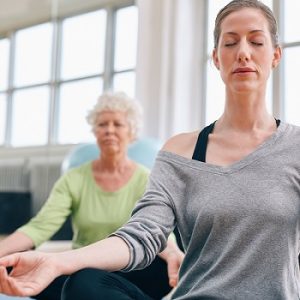
More evidence that low-calorie sweeteners are bad for your health
Studies show that artificial sweeteners can raise the risk of hypertension, metabolic syndrome, type 2 diabetes and heart disease, including stroke.

Depression is an increasingly common problem and increasingly challenging to treat.
According to the World Health Organization depression is the leading cause of ill health and disability worldwide. Lack of support, coupled with a fear of stigma, prevent many from accessing the treatment they need. But those who do have access to conventional treatment may also find that the pharmaceutical approach has limited effectiveness.
In this light it is both interesting and encouraging that several studies presented at the 125th Annual Convention of the American Psychological Association – a generally conservative event – show that those who suffer from depression may consider turning to yoga as a supportive therapy, since regular practice appears to lessen symptoms of the depression
Enjoyable and effective
“Yoga has become increasingly popular in the West, and many new yoga practitioners cite stress-reduction and other mental health concerns as their primary reason for practicing,” said Lindsey Hopkins, PhD, of the San Francisco Veterans Affairs Medical Center, who chaired a session highlighting research on yoga and depression.
Hopkins’ research focused on the acceptability and antidepressant effects of hatha yoga, the branch of yoga that emphasizes physical exercises, along with meditative and breathing exercises, to enhance well-being.
In the small study, 23 male veterans participated in twice-weekly yoga classes for eight weeks. Those deemed to be very depressed before starting the yoga program had a significant reduction in depression symptoms after the eight weeks. In addition the participants enjoyed the yoga and all participants said they would recommend the program to other veterans.
» Rates of depression are growing globally and sufferers often either don’t seek treatment, or don’t receive effective options for treatment
» Depression increases the risk of substance abuse, suicide and diseases such as diabetes and heart disease.
» A whole series of studies presented at a recent Annual Convention of the American Psychological Association have highlighted how helpful yoga – a simple and low cost intervention – can be as a treatment for depression.
» Practitioners can confidently recommend yoga as an effective supportive therapy in cases of depression.
New variations
Another study looked at a more specific version of hatha yoga commonly practiced in the West: Bikram yoga (also known as heated yoga).
Sarah Shallit, MA, of Alliant University in San Francisco investigated Bikram yoga in 52 women, age 25-45. Just more than half were assigned to participate in twice-weekly classes for eight weeks. The rest were told they were wait-listed and used as a control condition. Levels of depression in the women were assessed at the beginning of the study, and again at weeks 3, 6 and 9. Results showed that eight weeks of Bikram yoga significantly reduced symptoms of depression compared with the control group.
Similarly researchers from Massachusetts General Hospital, presented data from a pilot study of 29 adults that also showed eight weeks of at least twice-weekly Bikram yoga significantly reduced symptoms of depression and improved other secondary measures including quality of life, optimism, and cognitive and physical functioning.
“The more the participants attended yoga classes, the lower their depressive symptoms at the end of the study,” said co-author Maren Nyer, PhD.
Benefits for long-term or resistant depression
In a separate session, Nina Vollbehr, MS, of the Center for Integrative Psychiatry in the Netherlands presented data from two studies on the potential for yoga to address chronic and/or treatment-resistant depression.
In the first study, 12 patients who had experienced depression for an average of 11 years participated in nine weekly yoga sessions of approximately 2.5 hours each. The researchers measured participants’ levels of depression, anxiety, stress, rumination (repetitive thoughts) and worry before the yoga sessions, directly after the nine weeks and four months later.
Levels of depression, anxiety and stress decreased throughout the program, a benefit that persisted four months after the training. Rumination and worry did not change immediately after the treatment, but at follow up rumination and worry were decreased for the participants.
In another study, involving 74 mildly depressed university students, Vollbehr and her colleagues compared yoga to a relaxation technique. Individuals received 30 minutes of live instruction on either yoga or relaxation and were asked to perform the same exercise at home for eight days using a 15-minute instructional video.
While results taken immediately after the treatment showed yoga and relaxation were equally effective at reducing symptoms, two months later, the participants in the yoga group had significantly lower scores for depression, anxiety and stress than the relaxation group.
“These studies suggest that yoga-based interventions have promise for depressed mood and that they are feasible for patients with chronic, treatment-resistant depression,” said Vollbehr.
Bringing relief
The concept of yoga as complementary or alternative mental health treatment is so promising that the US military is investigating the creation of its own treatment programs. Jacob Hyde, PsyD, of the University of Denver, gave a presentation outlining a standardized, six-week yoga treatment for US military veterans enrolled in behavioural health services at the university-run clinic and could be expanded for use by the Department of Defense and the Department of Veterans Affairs.
There are proven, strong links between depression and other non-communicable disorders and diseases. Depression increases the risk of substance abuse, suicide and diseases such as diabetes and heart disease.
While it may not be a ‘cure-all’, yoga has real potential to work effectively alongside other approaches to bring genuine relief to those suffering from depression.

Please subscribe me to your newsletter mailing list. I have read the
privacy statement